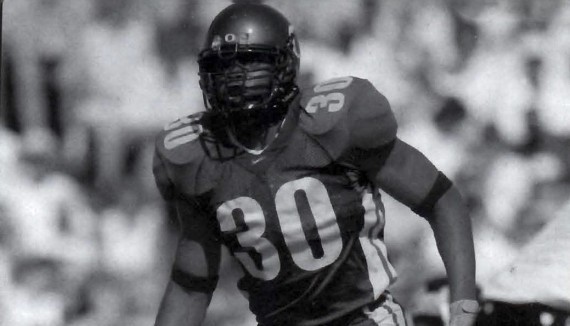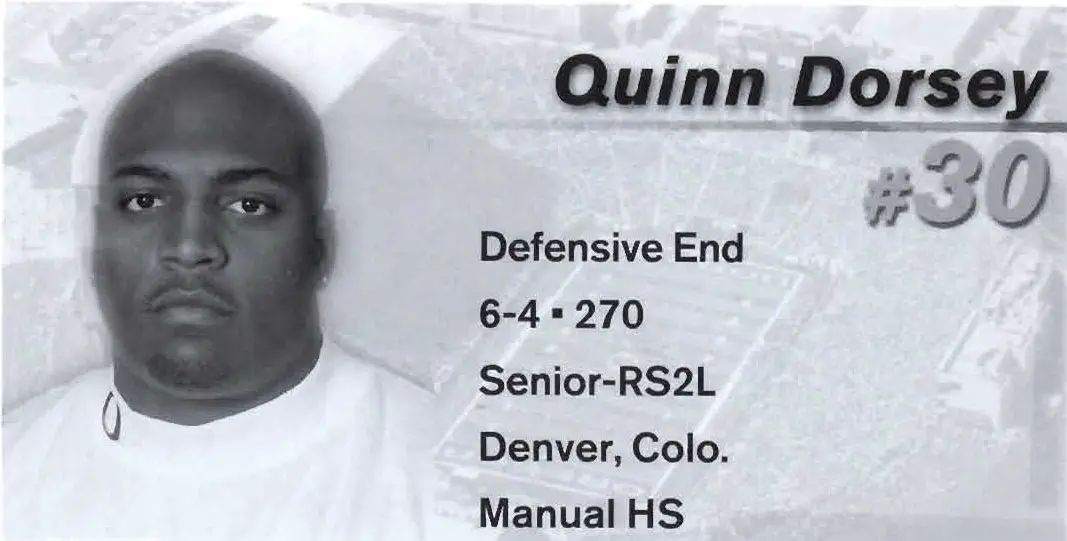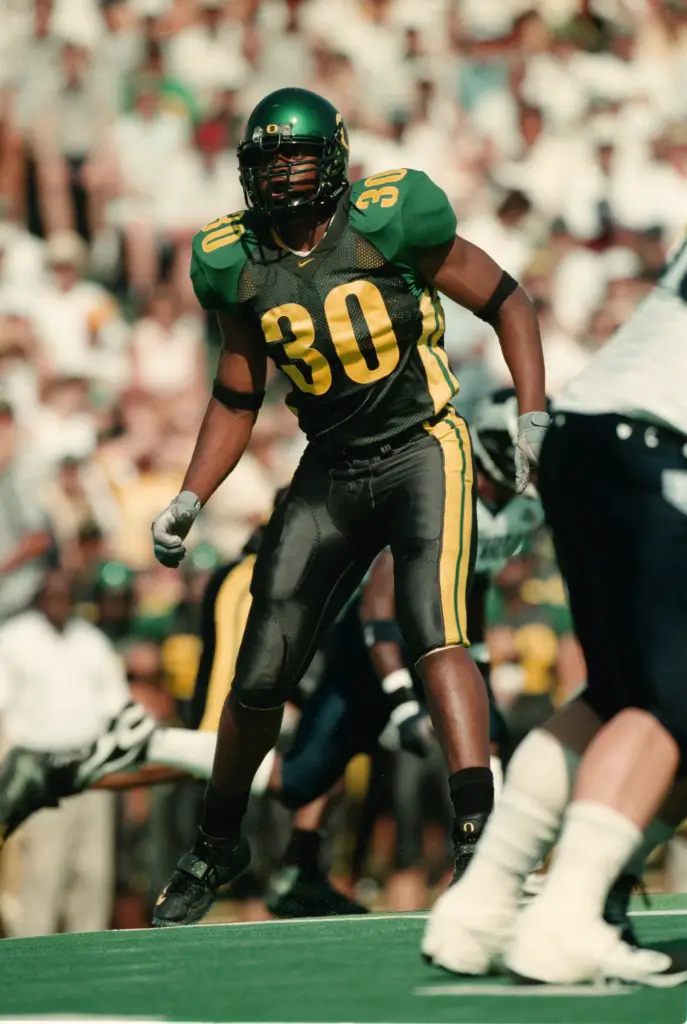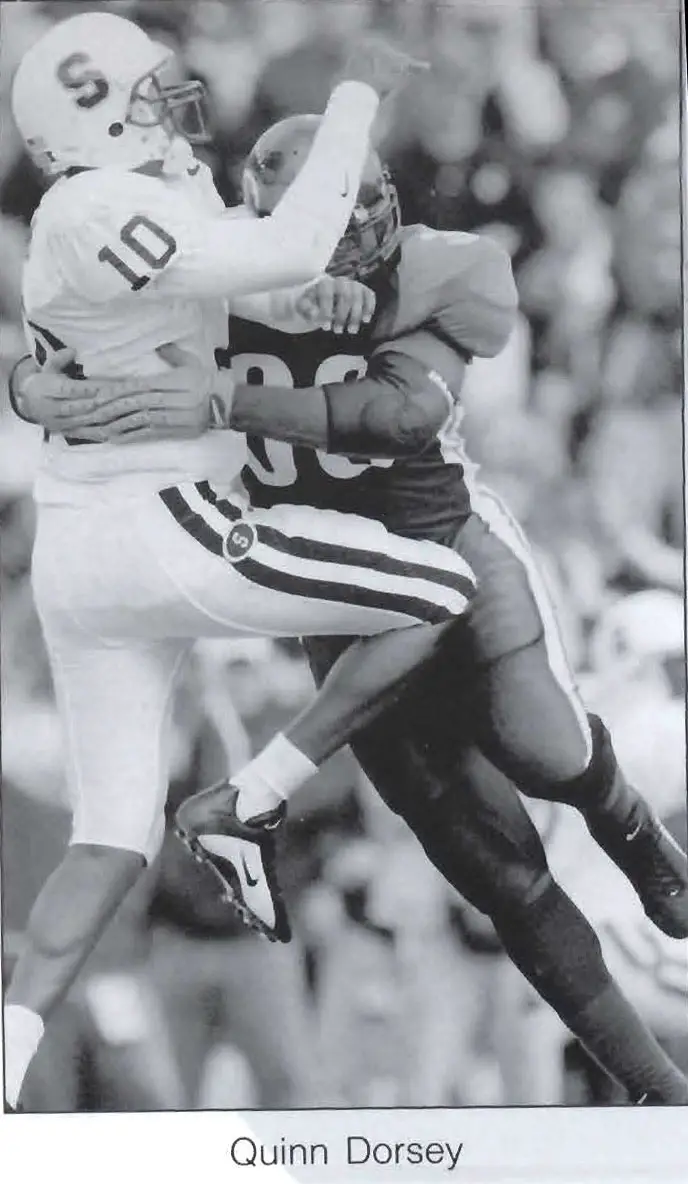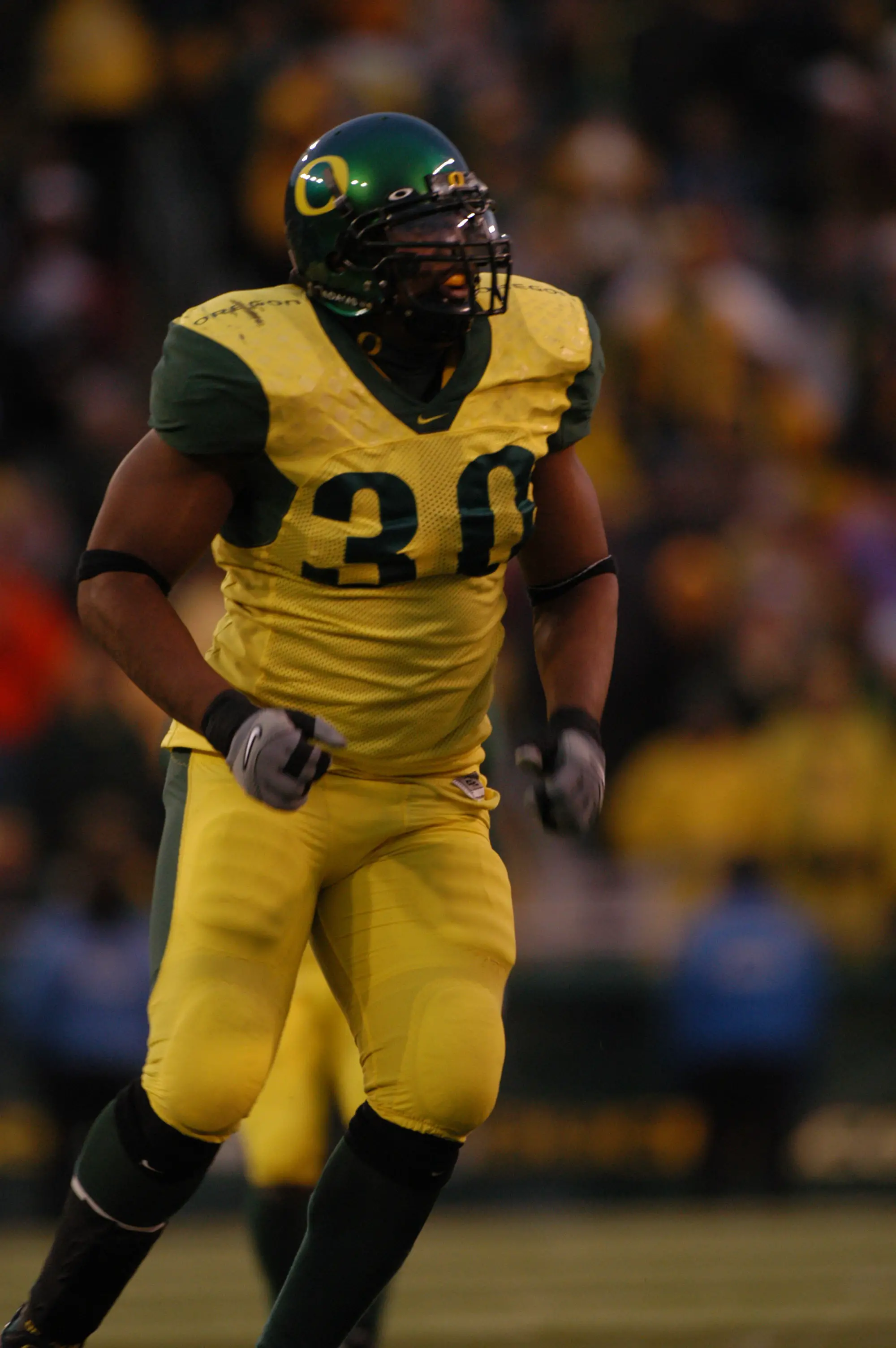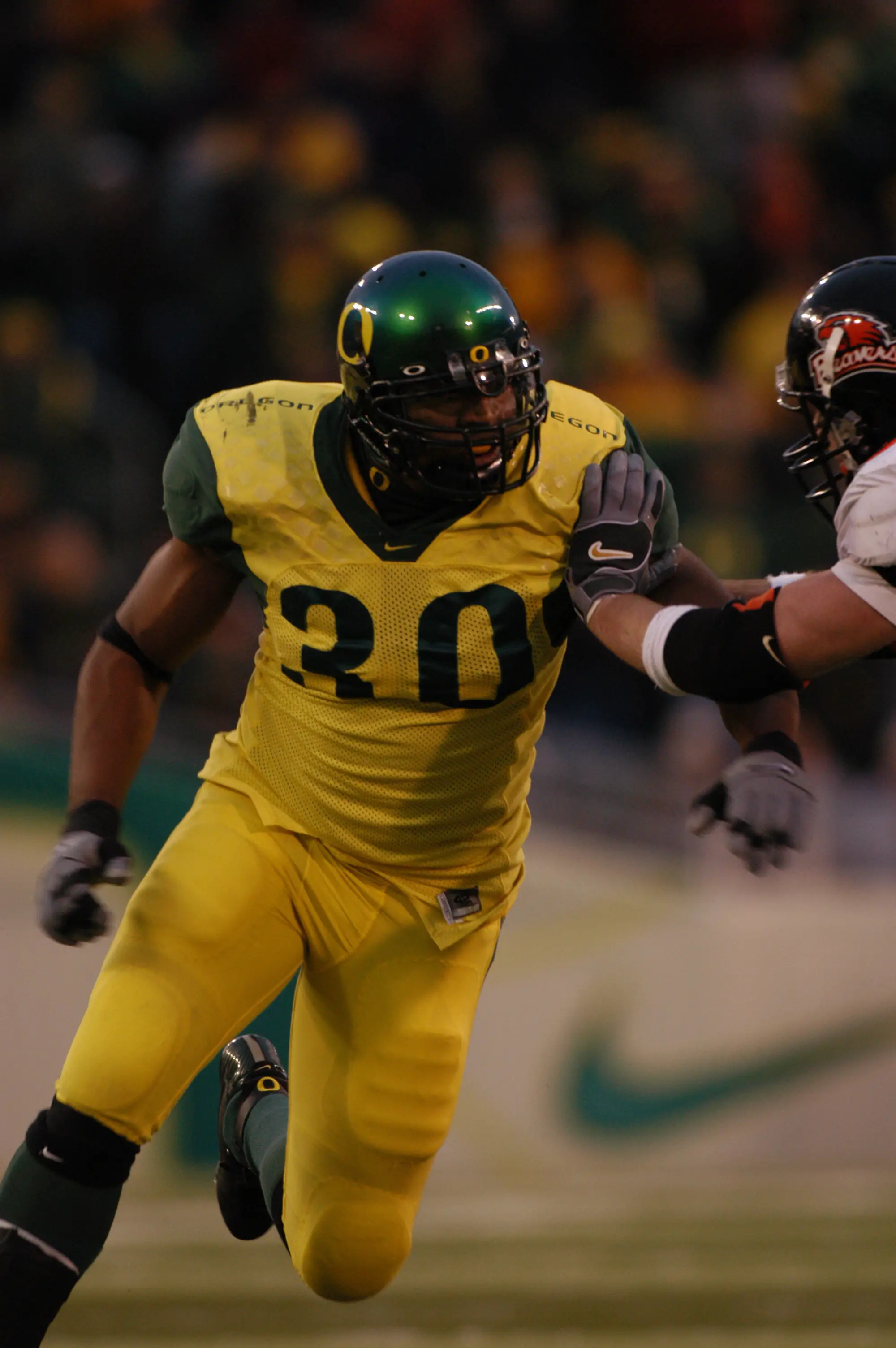John Giustina
“Come all without, come all within . . . You’ll not see nothing like the Mighty Quinn!” -Manfred Mann
A forgotten starting defensive lineman made a major impact during Oregon’s late 90’s – early 2000’s rise to fortune and fame. A quiet leader and huge anchor to Oregon’s defensive line, this valuable defensive end speedster played a key role in Oregon’s memorable 2001 season/run for the Fiesta Bowl, and beyond. As a FishDuck contributor, I am pleased to welcome back long-lost former Defensive End Quinn Dorsey.
“In life, you’re either going forwards or backwards… I don’t believe in going backwards.” – Quinn Dorsey, Oregon Defensive Lineman (1999-2003.)
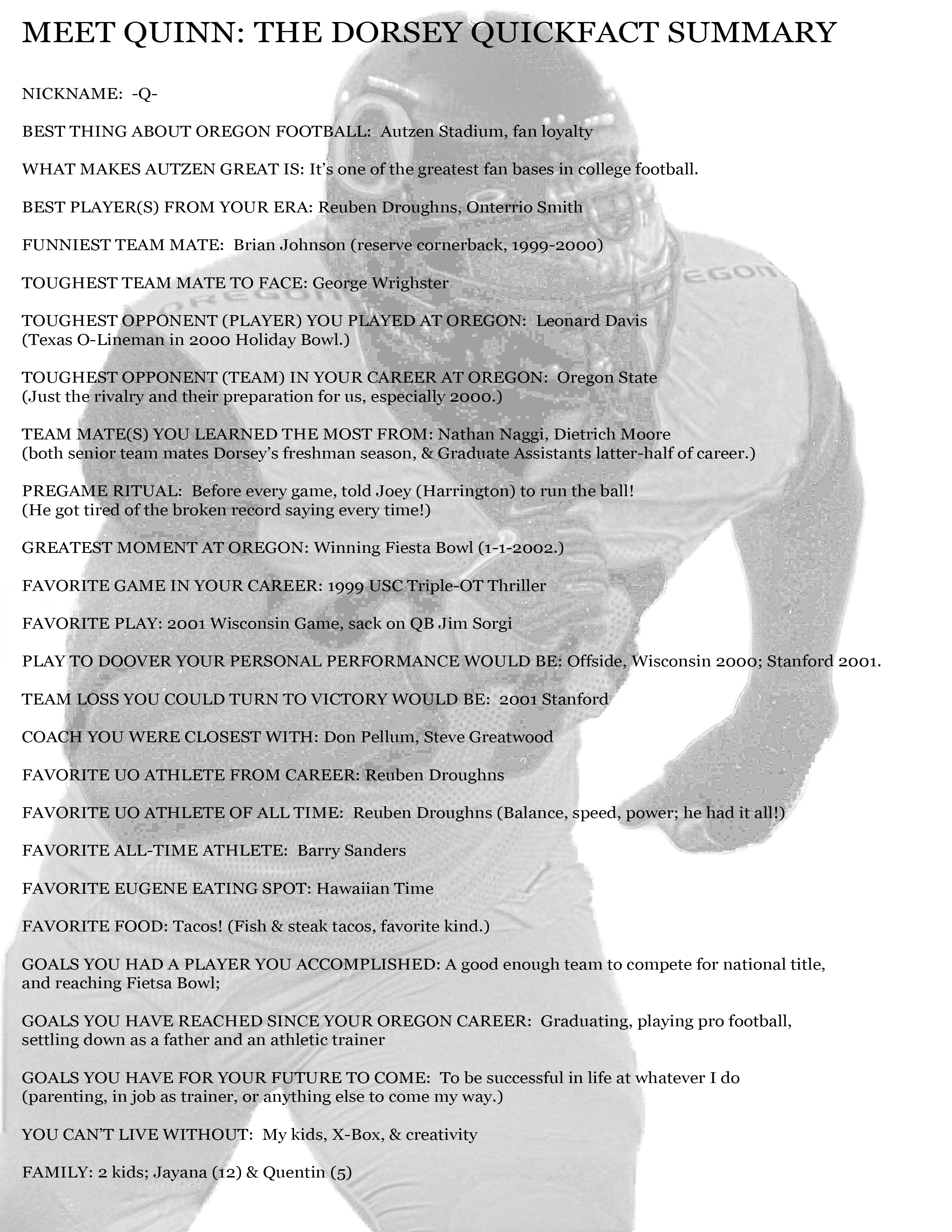
Q. WHAT SCHOOLS WERE RECRUITING YOU, AND WHAT MADE YOU DECIDE TO BE A DUCK?
A. “Colorado State, Kansas State, Notre Dame, Washington State. I committed to Colorado State because I thought I wanted to stay in the (Denver) area. But, after the Oregon trip, I decided to go there. Other teams were too full of party animals; it was a family environment at Oregon. I went to my high school Coach Nate Howard. I was like ‘Coach, I know I committed to CSU, but I think I want to be a Duck! I was a Blue-Chip recruit for CSU. I called their coach from Coach Howard’s office to de-commit, only to be cursed-out; when my high school coach took the phone, told him not to talk to a young man like that and hung up on him!”
EARLY DAYS AT OREGON:
Part of the 1998 recruiting class, Dorsey delayed his enrollment until spring term for academic qualification reasons; aiding his opportunity to become an immediate asset in the spring of 1999 and extend his playing time eligibility.
Q. IT’S HARD ENOUGH TO BE A STUDENT; BUT STUDENT-ATHLETES ALSO HAVE CLASS, PRACTICE, FILM STUDY, MEETINGS, TRAINING, ETC… CAN YOU DESCRIBE THAT LIFESTYLE CHANGE?
A. (Dorsey’s interview comments as follows:)
Q. HOW LONG DID IT TAKE YOU TO ACCLIMATE TO COLLEGE LIFE? WHO WERE SOME OF YOUR FRIENDS AND MENTORS ON THE TEAM TO HELP GET ADJUSTED?
A. “I would say a year and a half, just with so much to do and deal with. So many responsibilities. But, when you have true leaders like Dietrich Moore & Nathan Naggi, that really helps. Naggi really helped me transition on the field, as I started on the punt team next to Naggi who really got me dialed in on the field and made sure I knew my assignments. How leaders conduct themselves off campus and in meetings goes a long ways.”
Q. What do you remember of your first playing experience?
A. “One memory I’ll never forget: Our first game in ’99, we traveled to Michigan State! I’m a fresh-off-the-boat 19 year-old. ESPN was there, Nick Saban was their head coach — it was a big deal! I remember being on the sidelines freaking out, and this overwhelming feeling of ‘I can’t believe I’m here!’ It was surreal, I was stunned by those mile-high stands and sea of fans. That really had an impact on me to begin my career; going from watching it on TV to being on TV. ‘OH S***, this is really happening!'”
Q. What are some of your earliest memories of being part of the team?
A. “That first training camp was an eye-opener. One of the first practices, Derien Latimer (on a kickoff return) hit me nice! He then gave me the look, and I was like ‘I thought we were on the same team!’ It didn’t register to me that this was practice – I was a knucklehead back then! That first camp really let me know this is business, and you have to perform!”
As a true (grayshirt) freshman in 1999, Dorsey worked his way into the lineup in nine of 12 games. In only the third game of the season, Dorsey saw playing time in a blowout over Nevada. He also aided in a huge comeback over UCLA by forcing a fumble that led to a field goal and giving Oregon momentum.
MID-CAREER:
The 2000 season was huge for Oregon, who was packed with defensive line depth. Dorsey saw the field in six games despite being behind big names such as Jed Boice, Saul Patu, Seth McEwan, James Rose, and Jason Nikaloa. His first play of the season came in the second game at Wisconsin, starting on special teams. In the unforgettable “Desert Miracle” shootout victory at Arizona State, Dorsey only played five snaps, yet registered two unassisted tackle — one for loss. He saw scattered playing time as a valuable reserve the rest of the season in Oregon’s successful run for the Holiday Bowl and Pac-10 co-championship.
The memorable 2001 Fiesta Bowl campaign was huge for Oregon, and Dorsey was an asset from the start with his size and speed. A huge gap was left in the D-line with the graduation of Boice, Patu, Nikaloa, Rose, etc., leaving a huge question mark at the voids. Ready to meet the challenge, Dorsey made his presence felt the very first game in an unforgettable shootout over Wisconsin. Early in the first quarter, he hit Wisconsin QB Jim Sorgi, causing the ball to pop up and be picked by opposite end Darrell Wright. He posted one tackle-for-loss, a sack, a QB hurry, a forced interception, – and a forced fumble near the end to seal the deal. Arguably the defensive player of the game, his two huge turnover-forcing plays made a huge difference in the narrow 31-28 victory.
Oregon went on to win the outright Pac-10 Title, with Dorsey making a big difference with 65 plays from scrimmage in a tight win vs USC, and three tackles against both Stanford and Arizona State. In the memorable Fiesta Bowl, Dorsey registered four tackles in only 39 snaps; two of them QB sacks. 2001 was Dorsey’s biggest year, as he played in all 12 games, (even while splitting time with Darrell Wright) finishing with an impressive ten tackles for loss — the most of any lineman. He also had five QB sacks, tying for second place on the entire defense.
CHALLENGING TIME:
In the summer of 2002, Dorsey was set to take the field for his senior season. Prior to the start of the season, disaster struck in more ways than one for the senior-to-be. Physically, he had knee trouble and wasn’t 100%. The death of his grandmother, with whom he was very close, made it difficult to focus on football. Tragically, Dorsey also faced another sudden death, losing his baby daughter. To “add insult to injury,” the NCAA jumped to a conclusion that Dorsey would be required to serve a controversial suspension, claiming the NCAA “extra benefits” policy was violated. Given his delayed 1999 enrollment, Dorsey had a redshirt year to use. In light of the three difficult obstacles, he redshirted the 2002 season to handle the difficulties and get his life back on track, while also rehabilitating his knee.
A STRONG SENIOR COMEBACK:
The 2002 year was difficult for Oregon. Luckily for Dorsey, he did not have to take part in the forgettable year of mediocrity. Many had forgotten his 2001 impact, and some even wondered if they would see him in an Oregon uniform again. Not only did he return, but he came back a stronger man and true senior leader who took the time to learn more about being an athlete during his time of healing. Though he was forced to sit out the beginning of the year due to an unproven NCAA “extra benefits” violation, his presence and senior leadership were felt from the start. He remained a quiet leader/inspirational player on the sidelines and scout team member for the first several games (including the memorable Michigan home victory), then returned to the starting lineup when the suspension was lifted. Dorsey picked up where he left off, starting immediately and greatly aiding Oregon at the D-Line position during a mid-season slump. They lost his first several games back, but Dorsey and the senior leaders weren’t about to let the year end on a low, (as had happened the previous year.)
With Oregon on a three-game losing skid, Dorsey played a huge role in a memorable defensive-dominated shutout win over Stanford. Leading 28-0, Oregon was serious about its first conference shutout victory in 11 years, and Dorsey was there to make it stick on consecutive plays in the third quarter. On one Stanford drive, he had four huge plays (an assist, a sack, a third-down stop, and a fake punt stop) to foil the drive. With Dorsey’s senior leadership, the line later held Stanford on a seven-play goal-line stand to begin the fourth quarter and preserve the shutout, 35-0.
Several weeks passed until then-dominant California came to town for Jeff Tedford’s first return to Autzen since coaching at Oregon. Arguably the greatest play of Dorsey’s career came in that game — his semi-final game at Autzen. On a rainy night at Autzen, Oregon made a sack to initially force a fourth-down situation. An unsportsmanlike conduct gave Cal a fresh set of downs, which turned out to be a “blessing in disguise,” to set up Dorsey’s greatest play. Current NFL Veteran QB Aaron Rodgers had a low-point of his collegiate career, as Dorsey read the play beautifully and blitzed straight into Rodgers, untouched for the perfect blindside sack. Coming off 4-5 losses, Dorsey and company rebounded by holding Cal’s offense in check following a 17-7 deficit that cold night. The famous power outage at Autzen delayed the game nearly an hour to allow Oregon to regroup and come back to win 21-17 with great defense and an offensive comeback at the end. “That’s the night that the light’s went out in Autzen!”
“In that Cal game, I had recognized the formation, and knew it would be a pass. So, I keyed the ball, moved when it moved, allowing me to get off and sack the QB.”
Oregon won its final three regular season games, including a blowout of UCLA on the road and a hard-fought Civil War at home, where Dorsey (in his home finale) had a hit on current NFL superstar RB Steven Jackson, and the Ducks held Jackson in check for a 34-20 victory. Dorsey had a great final game as a Duck in the 2003 Sun Bowl, and Oregon kept it close, falling just shy of victory on a last minute field goal. However, Oregon completed it’s tenth-consecutive winning season, with Dorsey (despite playing in only eight games) finishing 2003 12th in total defense (third for all linemen, with 24 total tackles, averaging three per game), five tackles-for-loss for 22 yards, and three QB sacks for 16 yards. He left in style and happy as a senior leader; going from a boy to a man in his longer-than-usual college football journey.
Q. What did your position coach teach you that sticks out the most? Do you have any specific stories about any of your coaches?
A. “Knowledge! Not only understanding YOUR defense, but THEIR OFFENSE! Had a few position coaches (Greatwood, Pellum). To know your job is one thing, but when you can understand the entire defense — you can virtually freelance within it. To understand the call of linebackers, defensive backs, to know the alignment of everyone defensively allows you to play freer. THEN, to take the next step and know what the offense is doing is huge. If there’s one thing to teach as a coach, it’s to know each other on defense, and I want my players to know what the offense is doing. Tendencies are huge. We’d get playbooks with them, but I didn’t start really studying them until my senior year (where I knew what percent chance they’d do what play). If everyone on your defense is that dedicated, it’s an amazing and scary defense.”
POST-COLLEGE FOOTBALL DAYS:
Oregon was not the final stopping point for Quinn Dorsey’s football career. Following the 2003 Sun Bowl, he trained for the NFL and had an adventurous run as a pro. In fact, was the highest-paid free agent in Patriots history. He played in the NFL for New England, Chicago, Seattle, Texas; and the Arena Football for his hometown Colorado Crush (with former UO team mate Saul Patu.)
Q. AFTER YOUR COLLEGE DAYS WERE OVER, WHAT DID YOU DO? (ANY COACH RADCLIFFE MEMORIES?)
A. (Dorsey’s interview comments as follows:)
Q. WHAT WAS IT LIKE TO LEAVE THE DUCKS/PROS AND MAKE A LIFE BEYOND PLAYING FOOTBALL?
A. (Dorsey’s interview comments as follows:)
WHERE ARE THEY NOW:
Quinn Dorsey is back in his hometown of Denver. Wanting to continue work in the athletic field, he is employed by Fitness 19 (a national fitness-club chain) as a successful athletic trainer. Aside from that, he has two children: daughter Jayana (12) and son Quentin (5). All in all, Dorsey is a good man and very happy to be where he is today. The difficult times he faced made him all the bigger man he is today. “Being able to go through hard times and come out on top is a tribute to perseverance. In life, you’re either going forward or backwards; I don’t believe in going backwards.” He certainly is going forward to this day as a successful trainer, father, and inspiration to those he comes to contact with day to day. There is no doubt at all that being an Oregon football player changed Dorsey forever into a big man and inspirational leader.
FINAL MESSAGE TO THE FANS:
“I’d just say keep Autzen rocking. If you ask me, it’s one of the greatest fan bases college football has to offer. Lots of ESPN commentators have never been, and if they ever went, they’d understand why it’s the best place to play on the planet! If only I could strap up one more time just for those fans to listen to the ‘O’ and that Harley rev up in the tunnel! That was good stuff.”
WRITER’S POSTSCRIPT NOTE:
Personally known to me since his playing days, Dorsey has always been one of my favorites. His inspirational leadership on the field, work ethic, and kindness & appreciation for his Oregon fans (especially kids at the time) always made Dorsey a fan favorite. At practices, he always took the time to greet his fans, and would always ask how I was doing and thank me for my loyalty to the program. I wrote Quinn a farewell letter following his departure from Oregon. To my surprise, the following year I ran into him at an Autzen home-game during his NFL bye week. He (previously knowing me by sight but not name) guessed it was I who wrote, and said how much it meant to him – even giving him chills to read. Special thanks to Quinn for dropping everything and taking the time for this interview on a moment’s notice; as well as always welcoming my support of Oregon football and your career. Bravo, Mr. Dorsey!
These are articles where the writer left and for some reason did not want his/her name on it any longer or went sideways of our rules–so we assigned it to “staff.” We are grateful to all the writers who contributed to the site through these articles.

